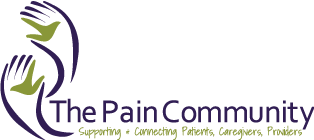Try to embrace–as much as possible:
- Take control of your overall health and the management of your pain. Start by making healthful lifestyle changes such as eating well, moving/exercising, reducing stress, etc.
- Insist on a thorough assessment and a treatment plan that includes options.
- Insist on care that is person-centered and tailored to your individual needs. The plan should consider who you are—in mind, body, and spirit, and in the context of your environment, not just what condition you may have. Insist on care in which there is open communication between you and your health care providers.
- Recognize that there is no single medication or procedure that will make you better. Learn about and consider all appropriate modalities (both conventional and complementary and alternative), approaches, and clinicians to achieve wellness (including your physical and mental health, function, and meaning and purpose).
- Get engaged. Get active. As much as possible, start doing things that bring pleasure and meaning to your life.
- Above all, accept that there is hope—that you can get better. You can become stronger and healthier in your body and mind, and with that, regain function, reduce your pain, and restore meaning and pleasure to your life.
Commit to working towards and honoring mutual respect, responsibility, honesty and open communication between you, your loved ones and your health care team. This first ideal is paramount in any successful relationship. There are additional ways to foster an effective pain care team.
